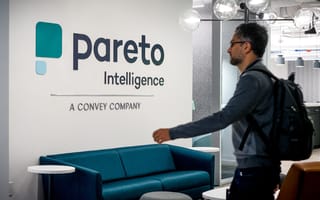When Darla Harrison begins her day as an outreach specialist at Pareto Intelligence, she might open her email to find a 32-page fax. She’ll carefully sift through the stack of private and protected information, panning for the one nugget of text she needs. Harrison treats this task with care to ensure the data is verified correctly before passing it on to the advisory team.
In short, data may be at the core of Pareto’s product, but it would be nothing without the people who handle it.
“It’s just not something that a computer can do. This is sensitive information that needs to be verified by a person; it might not be handled properly by a computer,” Harrison said.
Kristi Gemkow and Steven Singer are members of the advisory team that takes Harrison’s carefully vetted information and turns it into analytics and actionable insights for the company’s clients.
“The data that Darla shares allows us to make decisions, make updates and dig deeper into our algorithms. It’s one big continuous feedback loop,” said Gemkow, who is a manager on the advisory team.
About Pareto Intelligence
The goal is to offer clients a complete and accurate look at their revenue, which allows them to make better business decisions. But employees see the work as a two-way street, which is why the advisory team will often note what solutions clients are looking for and take those ideas back to the product team to help the company improve its suite of products. There’s also the matter of keeping up to speed with the ever-changing landscape of healthcare regulation.
Often, it’s these human aspects of work that are overlooked when talking about tech and data, but at Pareto Intelligence it’s critical to remember that people play a pivotal role on the team. That’s why Built In Chicago sat down with Harrison, Gemkow and Singer for an inside look at their work, the product and the unique position that Pareto Intelligence occupies in the industry.

What does it mean to be the human element of a data-driven business?
Singer: Kristi and I spend most of our time focused on the analytics component and conveying that to our clients in the most effective way possible. At a basic level, we provide a series of dashboards, reporting and analytics to insurance plans, risk-bearing providers and government markets on a day-to-day basis. There are three main areas of our work: client communications, analytic work and product development. What’s exciting is that, on this team and in this company, people at every level both have the ability and are expected to be serious contributors in those three categories.
A critical component of what we do is making sure we are on the cutting edge of what is happening in our part of the healthcare world. We stay up to date with the latest government regulations and news to make sure we are subject matter experts with our clients and internal teams.
Gemkow: We operate as a consulting firm and have to think on our feet and make changes quickly. Each day is different: Sometimes you’re sorting through information, sometimes you are preparing for a webinar, sometimes you are interviewing clients to figure out their process and sometimes you are in SQL running analytics. There’s a huge opportunity to gain hard and soft skills in this role.
There’s a huge opportunity to gain hard and soft skills in this role.”
Why is this work important to the company?
Gemkow: This work is the bread and butter of what we do. We have products and solutions — we are a healthtech company — but when it boils down to it we are B2B. Our clients rely on the advisory teams to tell them what this data means and how it affects their strategies. From my perspective, our clients use our analytics but what they are most interested in is what to do with that data. We recently had a client engage us to run a data integrity process to evaluate submission in the Affordable Care Act marketplace. We took a look to ensure their submission had been accepted and would receive proper credit, and we were running this for them in parallel with one of our competitors. Our competitor presented a financial opportunity that was ten times the size of ours, but it boiled down to what our client could actually do with that information. Our results were much more targeted, and we would be able to support them through everything they needed to do before the government deadline of May 2.
Harrison: What we are doing affects the bottom line. With our tools, we determine which members need outreach, and based on that outreach we make corrections and can recoup money. These technological advancements help improve the healthcare industry. We provide models for these organizations, helping them improve how they function and collect revenue.
What is the impact of your work on the bigger picture?
Gemkow: We’re giving clients a complete and accurate look at their revenue to allow them to make better business decisions, and that’s what we hope trickles down to consumers in the healthcare industry. If you have a solid understanding of your revenue, you can implement programs and work with care management to get members the care that they need. You can get members in to the doctor. We can help not only from a monetary perspective, but also just help our clients make those better global decisions. We can do all of that through our data and analytics.
How do your teams work together to maximize the understanding of data?
Harrison: We meet weekly with each other so that every part of the process is understood. We don’t just understand our own roles, we understand how our work affects the next role. There is real synergy. If there are any misunderstandings or a mismatch, we won’t hesitate to take a look at what we might have missed and correct it.
Singer: When I was originally considering this role, one of the things I was looking for was a position where I would have the opportunity to work with a lot of really smart people across departments without feeling siloed. That is certainly what I’ve got here. I feel lucky that if I get a tough question from a client about our data, I have access to anyone across data science, operations and other departments. That kind of internal collaboration is encouraged and happens every day. Being able to take that and make a real impact is really satisfying. We’ve got consistent communication across teams to make sure we’re delivering the best final product to our client. It’s an integral part of what we do on the advisory team.

Describe what it’s like to be a niche company in the healthtech industry.
Singer: It doesn’t feel niche because healthcare is so massive. But we are the subject matter experts in the field of risk adjustment, which is really intricate and ever-changing. It’s great to go deep on a subject and not feel stretched; it gives you the freedom to dig in. When we’re consulting and making presentations for our clients, we’re not just building a beautiful deck to nowhere. We’re actually generating insights that clients really value and take action on. These are multiyear, serious collaborative efforts. It’s great to know that the work we do is valuable.
When we’re consulting and making presentations for our clients, we’re not just building a beautiful deck to nowhere.”
What should job candidates know about working at Pareto Intelligence?
Harrison: This is the best company I’ve ever worked for. If you want to be involved in something, to be a part of the bigger picture and the bottom line, you can do that here. We also have committees focused on the culture and experience of working here, and we have fun together. We’re real people. So when we talk about the human aspect of this work, it means we also value work-life balance and compensate people well. This doesn’t feel like a job for me — it’s my career.











